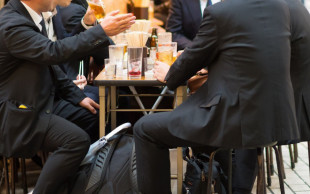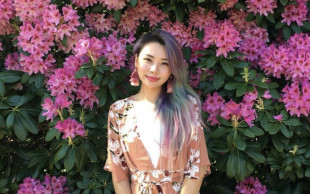STYLEGUIDE heads over to Lor Tawas, an idyllic site reminiscent of Singapore’s past kampong days, to find out more about Center Pottery from Founder Joan Huang on how her social enterprise that combines both psychology and pottery got started.
What inspired you to do what you do and how did you get started initially?
I started this social enterprise one and a half years ago in June. At that time, I was still working at the hospital as a doctor. After taking part in some brainstorming workshops on ideas that could help mental health patients and the elderly organised by the Singapore Centre for Social Enterprise (raiSE), I thought about sharing what it’s like to interact with mental health patients as I’d been through psychiatry rotations at IMH and Changi Hospital.
I was not going to start a company at all then.
However, after three weekends in June, I realised the fine arts classes I took during my undergraduate years (in Japanese studies and East-Asian Ceramics) came together well with what I studied in medical school. It was like a lightbulb moment that I could mesh what I learnt together.
In art therapy, they don’t do pottery because it’s very labour intensive. We have to wait for the clay to dry, trim it nicely, before placing it into the kiln two times each for three days consecutively. But I enjoy it as I like working with my hands. It’s a lot of hard work but I think it’s quite meaningful. It’s heartwarming to see the elderly come with their family and friends, share their stories and be at peace and calm – this setting is very nostalgic for them as it reminds them of their kampong days.
I thought everything comes together quite well. And so that's how we started. It's like a mashup of things that I enjoy and things that I’ve learnt. I thought I am in a unique position to put the two together and try to make it work.
How was the jump from working world to entrepreneurship like?
I think it's the attitude you need to have. Sometimes you don't have all the answers. It's very scary, but you just do and try. Do and then refine. Don't give up . The past one and a half years have been like that.
I don't have all the answers, and I'm not super perfect, and I made a lot of mistakes along the way, but thankfully my family and friends are very supportive. I think as long as your family and friends are supportive, it makes the going a bit easier as you wouldn’t face so much resistance.
It's scary sometimes. The fear and anxiety some mornings can be quite crippling, yet you still have to appear and put your best foot forward to conduct the class professionally and calmly.
What makes Center Pottery unique?
We are the only studio in Singapore that really focuses on mental wellness together with pottery as therapy, something unique because of our background and expertise. We want to use pottery as art therapy, as a way to relax, as a mindfulness technique for the general public and mental health patients.
How do you merge mental wellness and pottery together?
When I first started, I worked with two psychologists to create a curriculum for the mental health aspect. Inside our curriculum, there are elements of psychology therapy techniques which we put into our mindfulness kit. We try to combine the two together, so it's different from simply working on the clay and pottery.
What were some of the biggest challenges that you faced?
In university I studied engineering entrepreneurship, so I was familiar with business plans and theories. However, when you first start your business, you have to be very strong mentally. The fear and anxiety always comes.
In the hospital, we always see patients as a team. You have the junior doctors, the senior doctors, and the nurses - everybody works together. Yet many of my business friends say that starting a business is a very lonely journey, and it was hard making this switch after being used to working in a team.
Although we have potters to support on the technical side, for some of the fundamental business decisions, I still have to make them myself. It’s always the decisions that stump you, because you can get stuck at a fork – to go this way or the other way? You can spend the whole week thinking but at the end you just have to make your decision, and then see what the outcome is.
So the biggest challenge was feeling very lonely in the beginning.
What is your main driving force?
My main driving force is that I want to see this succeed. Failure is the greatest teacher yet growing up, I hate to fail. I really really hate to fail. So that in a way is my driving force.
However in business, you have to fail to learn. You have to accept that there is uncertainty, that there will be failure, and you must see it as learning opportunities and learning experiences without being afraid to make mistakes. Friends and mentors tell me that making mistakes and failure is common in entrepreneurship, and that you just got to tune your mind that "Okay, this is going to happen. I’ve got no time for perfection.".
Sometimes, you have to really be open to the fact that you will make some mistakes, just don’t make the same mistake twice.
What is your greatest inspiration or motivation in life?
I think from young my dad instilled in me that you have to strive to excel. These three words have constantly been on my mind since I was young. And I won't say that life has been super successful all the time, I think everyone goes through ups-and-downs .
When I was young I was quite driven to make the most of my time, school from Mondays to Fridays, and training as a national sailor on the weekends. All the time doing something. Constantly moving and trying to achieve things instead of lazing around. It's kind of drilled in me. So this is what motivates me all the time.
What would you say is your purpose in life?
Well, I joined medicine because I want to help people. Since I was young, I wanted to be a neurosurgeon – I felt it was very fascinating. But after going to med school, I realised only the brightest can be neurosurgeons. It was extremely difficult as the brain is a very delicate structure.
After that, I thought about doing orthopedics since I figured I enjoyed working with my hands, perhaps influenced from my sailing days where I always had to fix my boat.
So all through my life, I felt a compelling need to help people.Somewhere in my being, I find the most satisfaction in helping others.
What's the change that you want to make in this world?
I once had a thought that there's two kinds of jobs in this world – solving problems and creating things. I didn't know why, but I just thought this way and I wished I had a job where I could just create and make things. And I figured pottery would be my retirement plan when I’m old.
My business mentor said it’s better to be a big fish in a small pond. So to me, it's not about revolutionising art therapy or changing the way people live. It's about working hard in my own little niche, and I think that this is very meaningful as pottery can help people’s mental health.
What does success mean to you?
By some stroke of luck, I get to combine everything that I love, and do it everyday, so work doesn’t feel like work. This is awesome, and I think that I’ve achieved some sort of success because I can see life going on like this for a long time, with its simplicity and peacefulness.
Can you share about the mentors in your life and how they have helped you and shaped your life?
In sports, I've had coaches and sports psychologists to guide us along the way. Yet I think the greatest mentor that really shaped me was my dad - he would always say, "you must excel, you must strive!"
One thing I still distinctively recall was during my first week of JC where the teacher asked us to describe ourselves using a noun.
I thought for a while before coming up with me being … a mechanical pencil.
Because I need somebody to push me then I can become useful, and my dad has been the one pushing me all along, which really helped mould my outlook and how I do things.
If you can give your younger self one piece of advice, what would it be?
When I was young, some of my coaches liked to listen to old songs playing on the radio, and there was this one song called “Let it be.”
The lyrics went, “let it be, let it be”.
I hated that song.
In my mind, I thought, “Why do you want to let it be? Why don’t you do something to change your situation and improve it? Don’t just let it be!”
And I guess that motivated me to really achieve things, yet looking back now, some things you just have to let it be. For example, relationships. As you get older you go through different ones, and you realise there are some things you can never control. You cannot control another human being, whether they will love you back or how they react to certain things. If you keep brooding on it you'll never find inner peace, so eventually you will need to let it be or let it go.
So that's definitely the one piece of advice I would give my younger self – to have drive, but know also when you just have to let it go and move on.
What's the most interesting life experience you had?
During medical school, whenever I had breaks I would go on vacations by myself. It taught me to be independent, and also showed me that while it can be scary, at the end everybody is kind of the same regardless of race or nationality. We all have the same concerns like family, and we all have a side of humanity– and it made me feel like a global citizen.
There was one night where I missed my flight because the bus took really long to get to the airport. I had to go back to my friend’s apartment close to midnight and wait outside in the streets as they had gone to the movies. A middle-aged lady and her daughter (who looked about 8 years old) walked by and saw me sitting on the street with my bags. She asked, “Are you okay, why are you sitting out here?”. It wasn’t a very safe part of town apparently and I was all alone, so she invited me back to her house, which was a few blocks down.
When I went to her home, her husband and three children shared freely about their entire family history, and we spent several hours together. I was surprised that people are so kind and welcoming. It felt amazing that there are people around who are willing to go out of their way to help you, especially when you are alone.
What are your hopes and aspirations for the future?
Right now I'm really sunk in with work, but I’m super content seeing people go through the pottery workshops with feedback that they feel happier, more patient and satisfied with what they can create with their hands.
My hopes and aspirations will be to make my work more evidence-based. In the future, this will be some sort of research study or pilot study where we can quantitatively prove that pottery improves your mental well-being by some measure, over some weeks or months.
It is wonderful in my opinion if all the seniors can make at least one piece of their own pottery that they and their family members can keep and use. Just like when I was young, my grandmother sewed an entire quilt, which became my family’s heirloom after she passed away.
This is very meaningful especially with an aging population. We neglect that seniors once had vibrant youths, and they also had great experiences in their lifetime.
When you think of the big picture, it can be very overwhelming. When you think of all the seniors in Singapore, you may feel it’s impossible to help everybody. Hence, start small first. Look at your own family, and then maybe reach out a little more to your extended family. If you care for your own little cluster first, you can see how to work and progress from there so the task will not seem so big and overwhelming.
Anything else you would like to share with our readers?
Be more mindful of self-love and self-care. Take time out to experience new things. You can exercise or do other kinds of crafts occasionally . When you're busy, you don’t think about taking care of yourself.
The trick to self-care, self-love and mental well-being is to have insight about your self – you need to realise that you need help, before you'll go and look for it. So do a little self-check to see where you are now and where you’re heading from time to time.
















